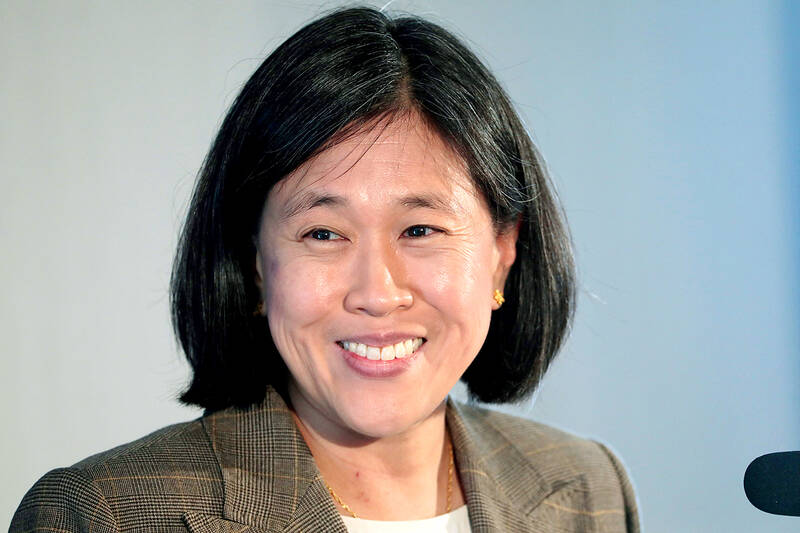US Trade Representative Katherine Tai (戴琪) on Friday raised complaints about China’s state-led economic policies during a meeting with Chinese Minister of Commerce Wang Wentao (王文濤), who objected to US tariffs and trade policies, as well as issues related to Taiwan, their offices said.
However, statements from the US Trade Representative’s (USTR) office and the Chinese Ministry of Commerce emphasized the need for Washington and Beijing to maintain communication on trade.
“Ambassador Tai highlighted the need to address the critical imbalances caused by China’s state-led, non-market approach to the economy and trade policy,” the USTR said in a statement released after the meeting on the sidelines of an APEC conference in Detroit.

Photo: AFP
“She also raised concerns about PRC [People’s Republic of China] actions taken against US companies operating there,” it said.
The Chinese commerce ministry said that Wang raised complaints about US economic and trade policies toward China, including US tariffs on Chinese goods, economic and trade issues related to Taiwan, and the US-led Indo-Pacific Economic Framework (IPEF), which excludes China.
Tai was yesterday scheduled to hold a ministerial meeting of countries in the IPEF talks, which aim to provide a US-centered alternative to China’s influence.
Last week, she announced initial trade agreements with Taiwan.
USTR is conducting a four-year review of US tariffs on hundreds of billions of US dollars worth of Chinese imports, imposed in 2018 and 2019 by then-US president Donald Trump.
Tai has long raised objections to China’s attempts to dominate certain industries using massive state subsidies, and said such issues continue to come up in the relationship.
Asked during a news conference whether the US would resort to using further trade tools to address China’s practices, such as a new “Section 301” investigation that could lead to more US tariffs, Tai said that “aspects” of Washington’s response were already evident in US economic policies.
“The benefit of sitting down and having a conversation with interlocutors from Beijing is so that we can understand each other better and understand how we are experiencing the impacts that we have on each other’s economies,” Tai said.
Wang’s meetings with Tai in Detroit and with US Secretary of Commerce Gina Raimondo in Washington on Thursday marked the first cabinet-level exchange in months between US and Chinese officials, following a series of setbacks that raised tensions between the world’s two largest economies.
Tai stressed the importance of maintaining open lines of communication between Washington and Beijing as they spoke on the sidelines of APEC, the US statement said.
The Chinese statement was similar in tone to concerns raised with Raimondo about US trade, investment and export policies.
US President Joe Biden and Chinese President Xi Jinping (習近平) pledged more frequent communications at a G20 summit in Indonesia in November last yearto avoid US-China tensions from turning into a new Cold War, but those plans suffered several setbacks, starting with the downing of a suspected Chinese spy balloon in US coastal waters.
These irritants continued through last Sunday, when G7 leaders pledged to resist China’s “economic coercion” and Beijing responded by declaring US memory chip maker Micron Technology a national security risk, banning its sales to major domestic industries.

Kehinde Sanni spends his days smoothing out dents and repainting scratched bumpers in a modest autobody shop in Lagos. He has never left Nigeria, yet he speaks glowingly of Burkina Faso military leader Ibrahim Traore. “Nigeria needs someone like Ibrahim Traore of Burkina Faso. He is doing well for his country,” Sanni said. His admiration is shaped by a steady stream of viral videos, memes and social media posts — many misleading or outright false — portraying Traore as a fearless reformer who defied Western powers and reclaimed his country’s dignity. The Burkinabe strongman swept into power following a coup in September 2022

‘FRAGMENTING’: British politics have for a long time been dominated by the Labor Party and the Tories, but polls suggest that Reform now poses a significant challenge Hard-right upstarts Reform UK snatched a parliamentary seat from British Prime Minister Keir Starmer’s Labor Party yesterday in local elections that dealt a blow to the UK’s two establishment parties. Reform, led by anti-immigrant firebrand Nigel Farage, won the by-election in Runcorn and Helsby in northwest England by just six votes, as it picked up gains in other localities, including one mayoralty. The group’s strong showing continues momentum it built up at last year’s general election and appears to confirm a trend that the UK is entering an era of multi-party politics. “For the movement, for the party it’s a very, very big

A new online voting system aimed at boosting turnout among the Philippines’ millions of overseas workers ahead of Monday’s mid-term elections has been marked by confusion and fears of disenfranchisement. Thousands of overseas Filipino workers have already cast their ballots in the race dominated by a bitter feud between President Ferdinand Marcos Jr and his impeached vice president, Sara Duterte. While official turnout figures are not yet publicly available, data from the Philippine Commission on Elections (COMELEC) showed that at least 134,000 of the 1.22 million registered overseas voters have signed up for the new online system, which opened on April 13. However,

ENTERTAINMENT: Rio officials have a history of organizing massive concerts on Copacabana Beach, with Madonna’s show drawing about 1.6 million fans last year Lady Gaga on Saturday night gave a free concert in front of 2 million fans who poured onto Copacabana Beach in Rio de Janeiro for the biggest show of her career. “Tonight, we’re making history... Thank you for making history with me,” Lady Gaga told a screaming crowd. The Mother Monster, as she is known, started the show at about 10:10pm local time with her 2011 song Bloody Mary. Cries of joy rose from the tightly packed fans who sang and danced shoulder-to-shoulder on the vast stretch of sand. Concert organizers said 2.1 million people attended the show. Lady Gaga